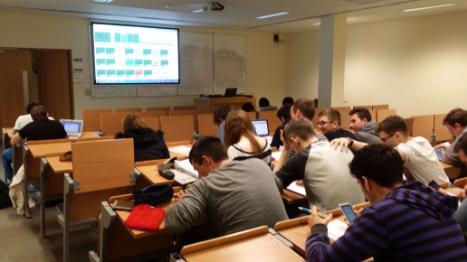Turning a traditional teaching setting into a feedback-rich environment
OVERVIEW

| MODULE TITLE: | ‘Stress + Finite Element Analysis’ and ‘Structural Analysis, Design and Specification’ |
|---|---|
| MODULE COORDINATOR: | Dr Arturo Gonzalez |
| MODULE CODE: | CVEN30170 and CVEN40150 |
| TARGET AUDIENCE: | Stage 3 and Stage 4 Civil Engineering and Structural Engineering with Architecture Students |
BACKGROUND
There is a constant need to look for new ways of motivating students, of providing them prompt feedback and of helping them to retain the material at lectures. This need is met here by introducing a novel formative assessment that makes lectures more entertaining and promotes student attendance and engagement. It consists of a game (a cyclist race simulating ‘Le Tour de France’) built around a Student Response System (SRS) where students are addressed with questions aligned to learning outcomes that they answer on their own tablets, laptops or smartphones during lectures.
The concept is tested on half and one third of the syllabus imparted in CVEN30170 (23 students) and CVEN40150 (21 students) respectively. Both modules have continuous assessment (30% and 20%) and end-of-semester exam (70% and 80%) components. The syllabus becomes ‘Le Tour de France’ and different stages take place at selected lecturing slots. Following a lecture, final stage standings with times are allocated to each student. By computing the times of all stages, it is possible to obtain the overall standings. All this info is updated live during and right after each stage. The timing of the students in the overall standings is employed for continuous assessment purposes.
GOALS
The main objectives of the game are:
• To develop a highly motivational learning experience.
• To provide students immediate feedback that will allow assessing their understanding and bring them early awareness if further study was needed.
• To provide the facilitator immediate feedback on delivery of topics that may need to be reinforced, redesigned or customized for some students.
• To make a tool available that will allow students learning and testing their knowledge at all times via their own wifi-enabled devices.
• To increase retention rates at lectures.
• To serve as teaching strategy to enhance the curriculum, to make learning fun and to engage and challenge students.
THE INNOVATIVE APPROACH
Live time questioning, instant result aggregation and visualization via projection on the theatre screen are key elements for a stage to engage students. Prior to the lecture, the facilitator uploads a database of questions to the SRS application. At the start of a stage, students log in to the SRS via their own mobile/tablet. Each student is assigned an anonymous id that only s/he can identify in the screen of the lecture theatre. The adoption of this anonymous cyclist id is a way for the student to recreate herself/himself in a new world while achieving deep learning.
Initially, all cyclists are grouped together. At some point during the lecture, the facilitator releases a specific set of multiple-choice questions that students are required to answer. The SRS, ExitTicket, is employed to record two features in all answers: accuracy and speed of reply. Right and faster answers make students cycle faster and can cause changes in the classification. During a stage, students can visualize progress in their own device and in the theatre screen. The facilitator has access to individual and global scores for each question and student that are used as reference for proving feedback as well as improving the delivery of the syllabus.
To see how it works in more detail, watch the video
RESULTS
The positive effects are supported by relative increments in the average result of the exam component of 28.8% and 4.9% in CVEN30170 and CVEN40150 respectively compared to the previous season, and by students’ confidential feedback including quotes such as:
“Tour de France allowed for quick revision and allowed me to understand concepts almost immediately”
“In class quizzes are very good and actually make you pay attention in class!”
“The SRS gave real examples of questions on a regular basis preparing me for the final exam”
“It was a really good way to learn and I paid a lot more attention in class and my attendance increased”
“I found the SRS a very useful tool in aiding my learning for the module; I definitively kept more focused in class than I would have otherwise!”
“This method was very effective as it kept the second hour of the class quite lively. The step by step method helped me identify areas I need to work on”
“I would happily do this again as it was very worthwhile and the other part of the module would benefit from this idea going forward”
“Very useful for recapping tough subjects”
Further Reading
A published article related to this showcase titled: "Turning a traditional teaching setting into a feedback-rich environment" in International Journal of Educational Technology in Higher Education (2018) can be read in open access on doi.org/10.1186/s41239-018-0114-1.